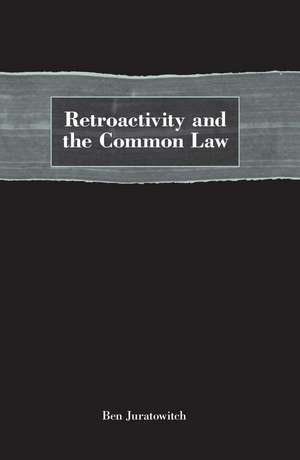Retroactivity and the Common Law
Autor Ben Juratowitchen Limba Engleză Hardback – 14 feb 2008
Preț: 539.57 lei
Preț vechi: 773.54 lei
-30% Nou
Puncte Express: 809
Preț estimativ în valută:
103.24€ • 108.09$ • 85.43£
103.24€ • 108.09$ • 85.43£
Carte tipărită la comandă
Livrare economică 07-21 aprilie
Preluare comenzi: 021 569.72.76
Specificații
ISBN-13: 9781841137612
ISBN-10: 1841137618
Pagini: 270
Dimensiuni: 156 x 234 x 21 mm
Greutate: 0.5 kg
Editura: Bloomsbury Publishing
Colecția Hart Publishing
Locul publicării:London, United Kingdom
ISBN-10: 1841137618
Pagini: 270
Dimensiuni: 156 x 234 x 21 mm
Greutate: 0.5 kg
Editura: Bloomsbury Publishing
Colecția Hart Publishing
Locul publicării:London, United Kingdom
Caracteristici
This book analyses the common law's approach to retroactivity. The central claim is that when a court considers whether to develop or change a common law rule the retroactive effect of doing so should explicitly be considered.
Notă biografică
This book is substantially based on the doctoral thesis written by Ben Juratowitch while an Australian Rhodes Scholar at the University of Oxford. He is now practising in international arbitration at Freshfields Bruckhaus Deringer in Paris.
Cuprins
Introduction1 Concepts, Labels and LimitationsA IntroductionB RetroactivityC RetrospectivityD Confusing Usage E Problematic Usage 1 Waldron on Criminal Sentencing 2 Fuller on Tax Liability F The Scope of this Book G Illustrations of Conceptual Distinctions 1 Cases Relating to Contractual Rights 2 Cases Relating to Personal Status H Conclusion 2 Historical Review A Introduction B General History and Statutory Construction C Adjudicative Retroactivity D Conclusion 3 Rationales for a General Presumption Against Retroactivity A Introduction B Certainty 1 The Meaning of Certainty 2 Certainty and Reliance (a) The Case for Actual Reliance (b) Evaluation of the Role of Actual Reliance (c) Certainty and the Ability to Rely on the Law 3 Certainty and Autonomy C Negative Liberty 1 Negative Liberty Generally 2 Deprivation of Security Relating to Past Events 3 Removal of an Actual Freedom 4 Negative Liberty and Criminal Law (a) Nullum Crimen Sine Lege Antea Exstanti (b) Nulla Poena Sine Lege Antea Exstanti D Fair Warning E Defeasibility 1 Introduction to Defeasibility 2 A General Principle of Fairness 3 Where Uncertainty is Inevitable 4 The Exceptional Nature of Retroactivity F Conclusion 4 The Presumption Against Retroactivity in Statutory Construction A Introduction B The Nature of the Presumption Against Retroactivity C Applications of the Presumption Against Retroactivity D Fairness as a Determinant of the Applicability of the Presumption E A Presumption of Variable Strength? F Rebuttal of the Presumption Against Retroactivity 1 Express Words or Necessary Intendment 2 Validating Statutes 3 Importance of Subject Matter G Detailed Studies 1 The Intertemporal Effect of the Human Rights Act 1998 (UK) (a) Was Retroactivity in Issue? (b) Treatment of the Presumption Against Retroactivity (c) Applicability of the Presumption Against Retroactivity (d) Fairness and a Presumption of Variable Strength (e) Statutory Language 2 Retroactive Sentencing (a) Article 7 of the ECHR and the Common Law Presumption Against Retroactivity (b) The Common Law Presumption Against Retroactive Sentencing (c) Retroactive Changes in Favour of the Defendant H Conclusion 5 Adjudicative Retroactivity A Introductory Matters 1 What is Adjudicative Retroactivity? 2 The Declaratory Theory 3 The Scope of this Chapter B The Doctrine Of Precedent and Judicial Attachment to Existing Principle in Novel Cases C The Marital Rape Cases 1 Outline of the Facts, Decisions and Issues 2 Foreseeability of Legal Change 3 Heinous Conduct 4 Changed Status of Women 5 An Illogical Immunity 6 Conclusions on the Marital Rape Cases D Restitution of Money Paid under a Mistake of Law 1 The Facts and Issues in Kleinwort Benson v Lincoln County Council 2 Reasons for Retroactivity E Private Law 1 The Creation of New Law without Overruling Prior Authority (a) Existing Authorities in Disarray Making a Degree of Retroactivity Inevitable (b) Ability to Rely on the Law not in Issue (c) Gradual Development of New Law (d) Moral Obloquy (e) Use of Obiter Dicta to Signal a Change in the Law 2 The Creation of New Law by Overruling a Prior Authority (a) Ability to Rely on the Law not in Issue (b) Prior Authority Wrong in Principle (c) Response to Changed Legal Circumstances (d) Response to Changed Factual Circumstances (e) Absence of Effect on Litigants before the Court (f) Refusal to Overrule a Decision because of Potential Retroactive Effects 3 Overruling a Prior Judicial Interpretation of a Statute 4 Conclusions on Private Law F Public Law 1 The Creation of New Law without Overruling Prior Authority 2 The Creation of New Law by Overruling Prior Authority (a) Judicial Review of Questions of Law (b) Judicial Review of Questions of Fact 3 Overruling a Prior Judicial Interpretation of a Statute 4 Conclusions on Public Law G Criminal Law 1 The Creation of New Law without Overruling Prior Authority (a) Judicial Response to New Factual Circumstances (b) Perceived Immorality 2 The Creation of New Law by Overruling Prior Authority (a) Prior Authority Wrong in Principle (b) Retroactivity in Favour of a Defendant 3 Overruling a Prior Judicial Interpretation of a Statute 4 Conclusions on Criminal Law H Overruling and the Age of a Decision 6 Prospective Overruling A What is Prospective Overruling? B The Status Quo 1 England 2 Australia 3 New Zealand 4 Canada C Evaluation of Prospective Overruling 1 Inconsistency with the Proper Scope of the Judicial Function in Common Law Systems 2 Arbitrariness 3 Prospective Overrruling of Decisions about Statutory and Constitutional Construction D Conclusion 7 Conclusions A Foundations B Comparison of Cases of Statutory and Adjudicative Retroactivity C Approaching Rebuttal of the Presumption D Legislative and Ju
Descriere
This book analyses the common law's approach to retroactivity.
